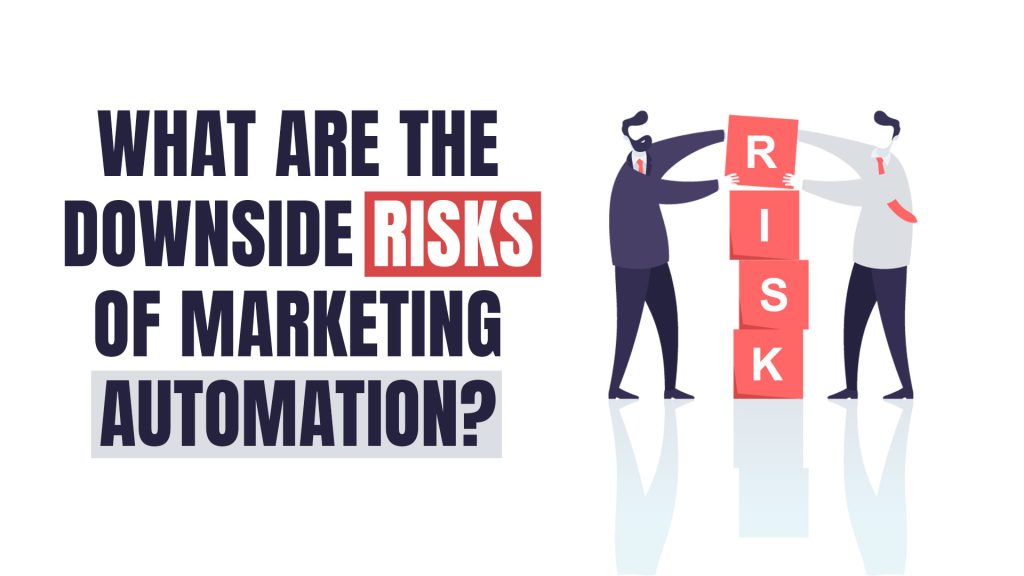While marketing automation offers numerous benefits, it also comes with several downside risks that businesses should consider. Here are some of the key challenges associated with marketing automation:
Lack of personalization:
Marketing automation relies on predefined rules and workflows, which can sometimes lead to a lack of personalization in communication. Customers may receive generic or irrelevant content, diminishing the effectiveness of the marketing efforts.
Loss of human touch:
Automated marketing can create a sense of detachment between businesses and their customers. The absence of human interaction may make customers feel like they’re dealing with a faceless entity, which can negatively impact customer satisfaction and loyalty.
Technical complexities:
Implementing and managing marketing automation systems can be complex, requiring technical expertise and ongoing maintenance. It may involve integrating multiple tools, configuring workflows, and troubleshooting potential issues, which can be time-consuming and resource-intensive.
Data quality and privacy concerns:
Marketing automation relies heavily on data, and the accuracy and quality of that data are crucial. Incomplete or inaccurate data can lead to ineffective campaigns or inappropriate targeting. Additionally, with the increasing focus on data privacy, businesses must ensure compliance with relevant regulations to protect customer information.
Over-automation and spamming:
Overusing marketing automation can lead to excessive or irrelevant messaging, resulting in customer fatigue and increased opt-outs. Bombarding customers with automated messages without considering their preferences can damage brand reputation and hinder customer engagement.
Inflexibility and rigidity:
Automated marketing systems often operate based on predefined rules and workflows, making it challenging to adapt quickly to changing market conditions or customer preferences. This lack of flexibility may restrict businesses from capitalizing on emerging opportunities or making timely adjustments to their marketing strategies.
Initial investment and training:
Marketing automation platforms typically require upfront investment in software, infrastructure, and personnel training. Small businesses or those with limited resources may find it challenging to allocate the necessary budget and time for implementation and training.
To mitigate these risks, businesses should carefully plan and strategize their marketing automation efforts, ensuring a balance between automation and personalization. Regular monitoring, testing, and optimization of automated campaigns are crucial to maintaining relevance and effectiveness. Additionally, a focus on data quality, privacy, and customer preferences can help build trust and enhance the overall customer experience.
Are you tired of spending countless hours manually managing your marketing campaigns? Ready to take your business to the next level with the power of automation? Look no further! We are thrilled to invite you to our highly anticipated “Free Workshop of Marketing Automation.” Join us get acquainted with the latest knowhow on Marketing Automation as we unravel the secrets of streamlining your marketing processes, boosting your conversions, and maximizing your ROI. Don’t miss out on this incredible opportunity to revolutionize your business. Register now and unlock the potential of automation for FREE!
Register for our FREE WORKSHOP.
Frequently Asked Questions (FAQs):
Q1. Can marketing automation completely replace human marketers?
A1. While marketing automation can streamline certain tasks, it cannot entirely replace the strategic thinking, creativity, and emotional intelligence that human marketers bring to the table. Successful marketing requires a blend of automated processes and human involvement.
Q2. How can businesses overcome the challenges of marketing automation implementation?
A2. To overcome implementation challenges, businesses should invest in proper training and education for their marketing teams. Seeking external expertise or partnering with experienced consultants can also help navigate the complexities of implementation.
Conclusion:
Marketing automation undoubtedly offers significant advantages for businesses seeking to optimize their marketing efforts. However, understanding and mitigating the potential downside risks associated with automation is crucial to ensure its successful implementation. By addressing challenges such as complexity, overreliance on technology, compliance concerns, brand dilution, and the need for human oversight, marketers can leverage automation to enhance their strategies effectively. Striking the right balance between automation and human involvement will enable businesses to stay agile, deliver personalized experiences, and achieve sustainable growth in the dynamic digital landscape.

